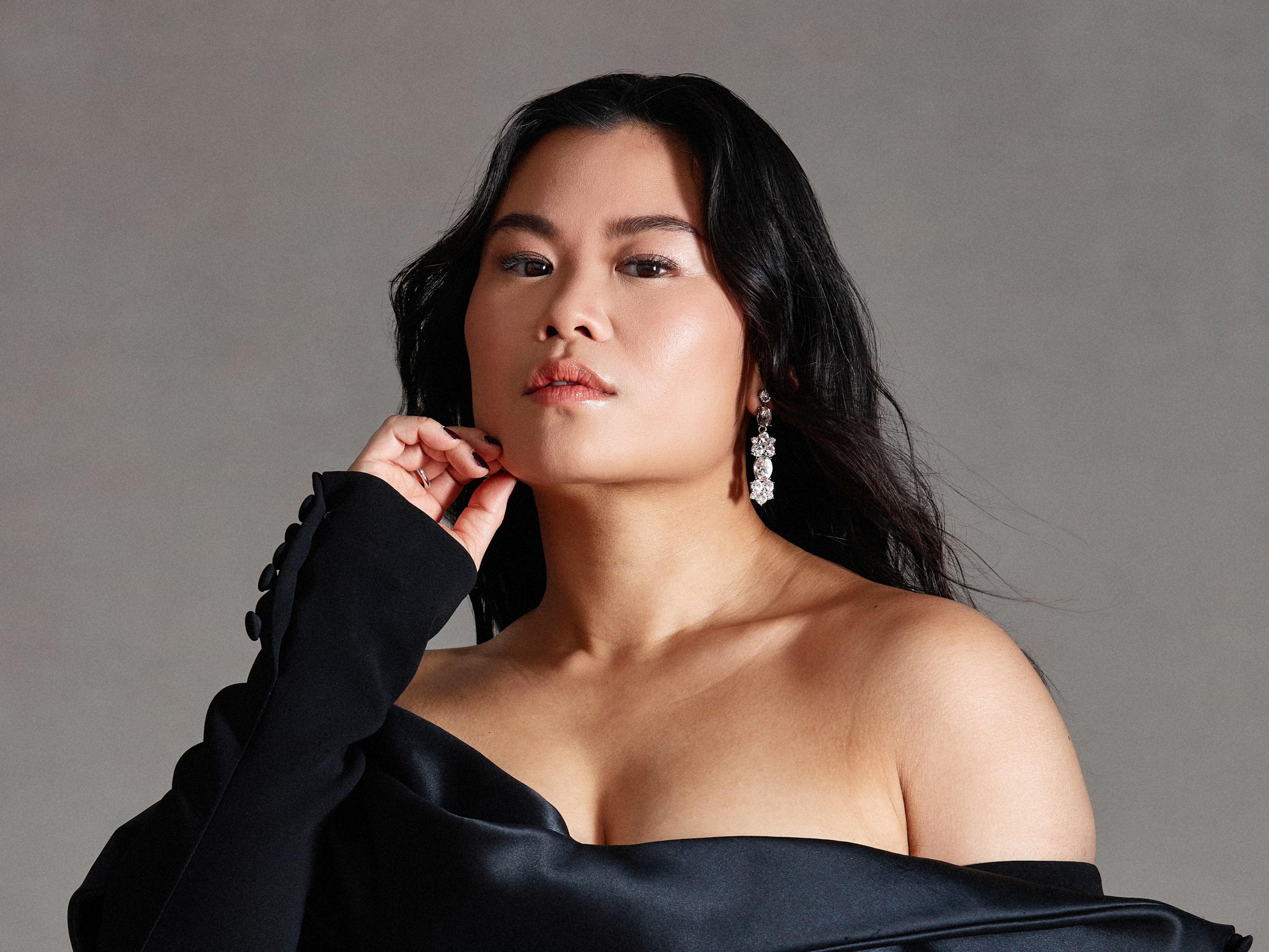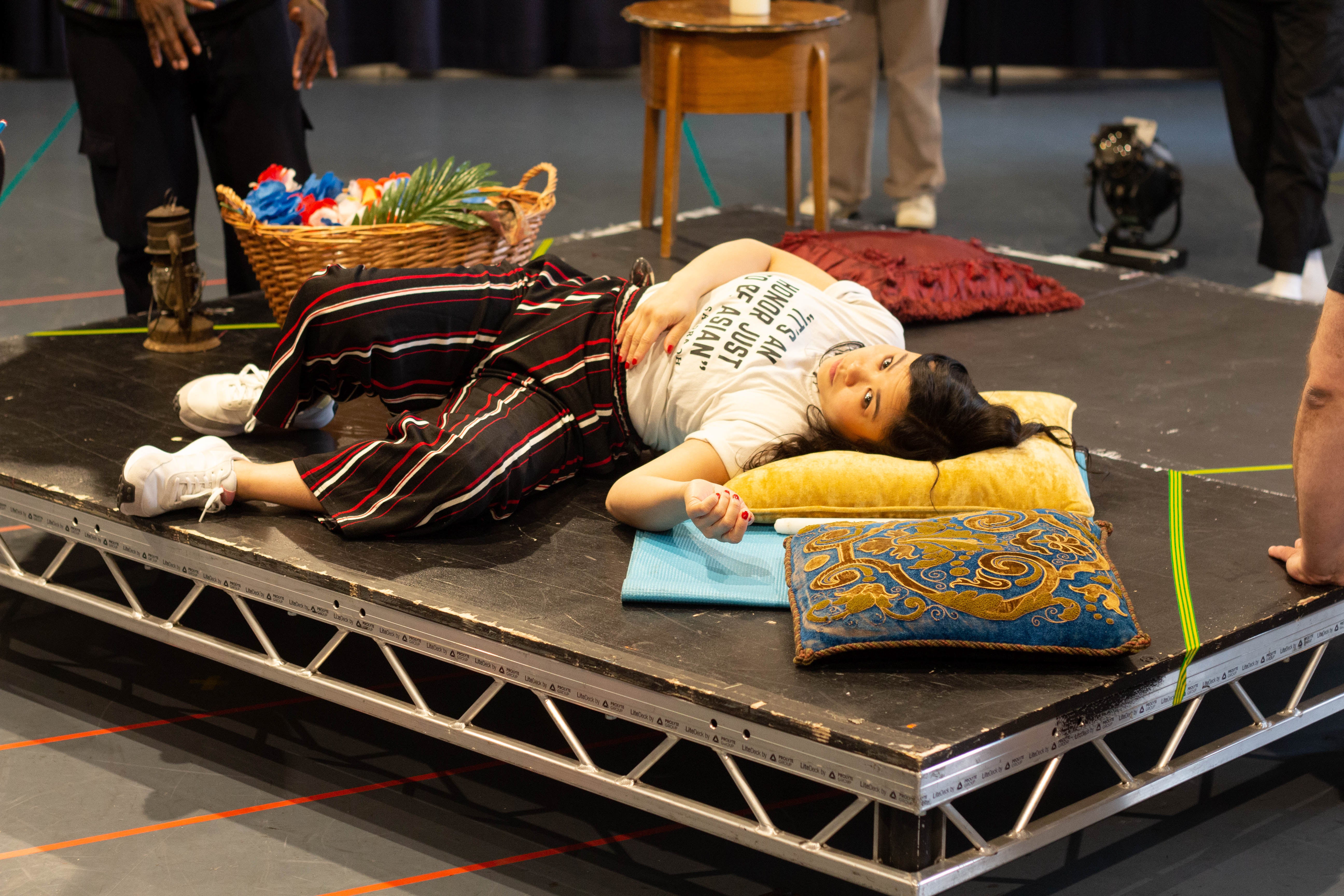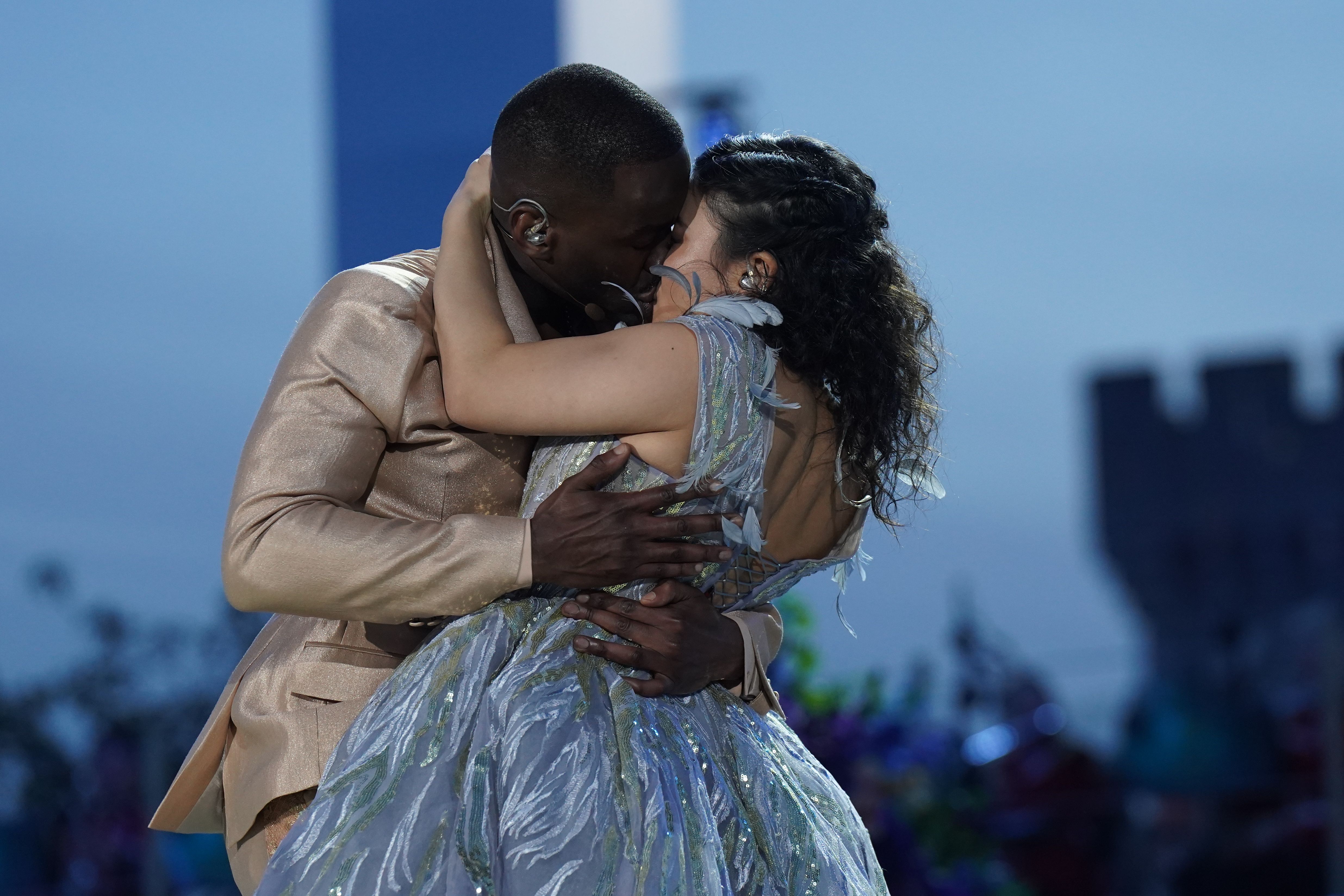Mei Mac: ‘It is society’s disease to oversexualise and dehumanise Asian women’
The Olivier-nominated star of ‘My Neighbour Totoro’ tells Annabel Nugent about challenging stereotypes in the ‘untitled f*ck m*ss s**gon play’ and performing Shakespeare for King Charles


This is not an attack on Miss Saigon,” says Mei Mac, the star of a play called, um, untitled f*ck m*ss s**gon play. Kimber Lee’s Bruntwood prize-winning drama, which opened in Manchester this month, is a scathingly funny implosion of the 1989 musical in its title – and every stereotype of East Asian women it pedals, not least their overt hypersexualistion. “We’re not actually saying f*** you Miss Saigon,” Mac, 30, insists over video call. “That’s not the point. The point is to say f*** the world for thinking that East Asian women are like this – but obviously, that’s a less catchy title.”
A punchy play with a political message may seem like a departure to those who saw Mac last year in the Royal Shakespeare Company’s critically acclaimed production of My Neighbour Totoro. As the four-year-old lead, Mac gave life to Studio Ghibli’s much-adored 1988 animated film, embodying a childlike wonder that truthfully belied her years. Untitled f*ck m*ss s**gon play is a less family-friendly affair.
In the play, a co-production between the Royal Exchange, Manchester International Festival and the Young Vic, the stereotypes in Miss Saigon are puffed up into cartoonish shapes, which pull focus to their sheer ridiculousness. Claude-Michel Schönberg and Alain Boublil’s 1989 musical, inspired by Puccini’s Madama Butterfly, tells the story of Kim, a Vietnamese sex worker in Saigon who falls in love and becomes pregnant with a white male American GI. He abandons her, returning years later to claim his son and ferry him back to the US. Left behind, Kim kills herself.
New York playwright Lee has said she wrote untitled f*ck m*ss s**gon play as a “rageful” response to seeing Miss Saigon on Broadway in 2017. Mac, who plays a satirical version of Miss Saigon’s tragic heroine in Lee’s play, recalls her reaction to the musical in more complicated terms. “In my gut, I felt really horrified, but I was too young – or too desperate for representation – to understand what that meant,” she says, noting that the performance, albeit problematic, was the first time she had seen so many actors who looked like her on one stage. Now that she has 12 years of industry experience, an Olivier nomination and has even performed for the King (more on that later), Mac can put a name to that horrified feeling. “The more options become available to me as an artist, the more I feel I have the power to voice what was uncomfortable to me watching Miss Saigon back then, and still is now.”
Untitled f*** miss Saigon play is deeply funny in the way it weaponises the musical’s offensive racial tropes. “And you are the sun, warming me with your kind, round American eyes,” swoons Kim upon meeting her GI lover. “I left some cherry blossom soap by the tub and we don’t have a razor but I gave my fish knife a good going over with Kenji’s sharpening stone,” Kim’s mum advises her daughter before a date. “Humour helps us navigate a world that’s difficult to exist in,” says Mac. “I think we’re done with trauma porn. Sometimes there is room to remember the real trauma that we have all been through as Asian women, and other times it’s necessary to laugh at it so we can heal.”
It is perhaps a little awkward that just 40 miles away, the Sheffield Crucible is staging a production of Miss Saigon at the exact same time as her play. “I kind of love that they are being put on at the same time as each other,” Mac grins, a mischievous glee dancing across her lips. “It’s really powerful that these shows are in conversation with each other because that’s the point of art and theatre. It’s not interesting if we start dictating to artists what they can and can’t do.” Mac isn’t excusing the racism and sexism perpetuated by Miss Saigon – she’s just more focused on how the play fits into the larger picture. “I’m less interested in talking about individual shows,” she says. “For me, they are the symptom of a larger disease in society in which East Asian and Southeast Asian women have been constantly oversexualised and constantly dehumanised.”
Responding to news that the Crucible would be staging Miss Saigon, New Earth – a company of British East and Southeast Asian artists, for which Mac is an ambassador – pulled its production of Worth from the venue in protest, citing the musical’s “damaging tropes, misogyny and racism”. Mac, who did not play any part in the decision to pull Worth, offers a diplomatic answer on the subject. “I support anyone who has any kind of feelings towards it – whether you think, ‘No I don’t want to see this’ or you think, ‘Yes, I do want to see this musical be put on and changed.’” Changed, of course, being the operative word.
Mac would “really struggle” to sit through Miss Saigon were it the same production she had seen years ago. “The world has moved on so much and I personally would struggle to see that overt sexualisation of east Asian women, portrayed with no agency and power.” As Mac says, a show that “rehashes a story that does harm, without opening new conversation” begs the question: why put it on at all? For what it’s worth, Sheffield Theatres has said its version will “reframe” the original – and schedules permitting, Mac is even open to watching it. “A lot of my friends are in it, the director Anthony Lau is a friend of mine. These people are artists who I want to support.” Later, she tells me, “The further we go down the route of trying to blame individuals who are already marginalised, as east and southeast Asian people and artists, we miss the point. The issue is the system – not the individuals who partake in it.”
Earlier this year, Mac performed at King Charles’s coronation concert opposite Sex Education star and the future Doctor Who Ncuti Gatwa. They performed excerpts from Romeo and Juliet on behalf of the Royal Shakespeare Company. “To be really frank with you, I was wracked with the decision over whether or not I should do it…” says Mac, not wishing to elaborate any further. “Ultimately I settled on saying yes because to have a Black and east Asian interracial Romeo and Juliet who are both openly queer perform those beautiful words felt subversive to me and it felt powerful.” Also, she adds, “I did it because I love the RSC and it was an opportunity to represent the RSC the way I have experienced it. The RSC [who also staged My Neighbour Totoro] is moving into a new [inclusive] era and I want to be a part of that change.” Her personal tactic, she says, is to work with institutions to make them more accessible and progressive from the inside. “But –” she clarifies. “If someone else’s tactic was to reject those institutions altogether, I would wholeheartedly support them in that, too.”

Born in Birmingham to Hong Kong parents, Mac has what she calls a “very common immigrant working-class story”. That story features parents who hoped she would be the first in her family to attend university, where she would study medicine. “Obviously”, Mac laughs. “It was bad,” she says of the moment she broke the news to her parents that she wanted to pursue drama instead. “It was really bad, because there was no security. My family had never seen anyone of east Asian heritage make a living from this, so it was incredibly terrifying. They didn’t believe I could do it because they thought, ‘You know how white people are, right? They’re not going to accept you or give you jobs.’ That was the rhetoric I was up against.”
Her mother has since come around, attending Mac’s shows when she can, but it took many years. “She didn’t understand what theatre was – because why would she? She was so focused on trying to lift our family out of poverty that [a job without financial security] was horrifying to her. That’s what happens when working-class immigrant families are forced to only think about survival. It’s a luxury to believe one might make a living prancing around on stage.”

Her parents were somewhat right to be wary. The industry Mac stepped into a decade ago was “a desert” for east Asian actors. “There was nothing, absolutely nothing,” she says. “I was often asked to come audition for sex worker roles who were really sensationalist and not fully rounded out characters.” Mac turned down roles and even auditions. She clarifies, however, that she would never criticise anyone for doing otherwise. After all, bills have to be paid. “It’s an impossible decision and not one that I wish on anyone, which is why I would never judge anyone for the choice they make and I think every individual has to decide on a case-by-case basis how they feel about that.” There has been a shift in the past five or six years, says Mac, who is seeing more opportunities for herself and actors who look like her. “I’m aware of the shoulders I stand on and I aim to make my shoulders broad enough for other people to stand on, too.”
Mac counts herself lucky she grew up in a strong matriarchal family. (“The notion that east Asian women are docile and submissive is not my experience,” she laughs. “Women in my family will not take s***.”) Still, despite her own “big gob”, Mac had been unsure how to behave in uncomfortable work situations. “I haven’t always known what I’m allowed to say, and it’s so easy for people to abuse their power,” she says. “Over the years, I’ve learnt that I also have power and I bring many things to the table, and I will not stand for anything that is remotely abusive or offensive or done without care. I’ve become more equipped to deal with that and I know my rights as a freelancer. I feel the younger generation of artists know that if they speak up about something, they have a community of people who would back them up.”

A community like, say, Rising Waves, the mentorship scheme Mac founded during the pandemic to help connect emerging British East and South East Asian (BESEA) artists with established ones. A welcome by-product of the initiative has been a change in the culture. “We’re supporting and championing one another, and so we’re no longer viewing each other as competition,” she says. “And we have empowered one other in the community to stand up for ourselves. We’re not going to settle for crumbs because we don’t live in a society of scarcity. We can live in a society of abundance.” Mac beams as she explains how people have started calling her “Mama Mei” in a nod to her somewhat maternal and protective role in the BESEA community. “At first I wasn’t sure what to do with that, but I think I’ve learned to embrace it now. You know, to have people view me that way?” she smiles. “That’s a serious honour.”
‘Untitled f*ck m*ss s**gon play’ is at the Royal Exchange Manchester until 22 July, and the Young Vic from 18 Sept to 4 Nov, co-produced by Headlong
Join our commenting forum
Join thought-provoking conversations, follow other Independent readers and see their replies
Comments


Bookmark popover
Removed from bookmarks